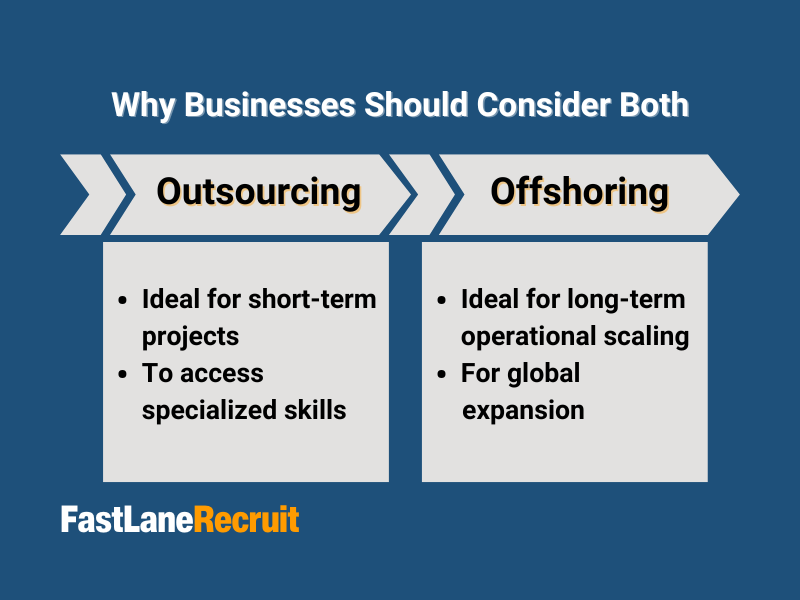Singapore is known for its strong economic framework and connectivity within the ASEAN region. Singapore is increasingly embracing strategies like outsourcing and offshoring to stay competitive in the market. While often used interchangeably, these terms have significant differences that can impact a business’s operations and strategy.
In this blog, we will break down the core differences between outsourcing and offshoring, benefits, challenges and why both strategies can be game-changers for companies operating in Singapore.
Content Outline
Key Summary
Outsourcing vs. Offshoring Defined
Understand the key distinctions: outsourcing involves third-party providers, while offshoring relocates operations abroad for long-term goals.
Strategic Fit for Singapore Businesses
Explore why Singapore’s location and economy make it ideal for leveraging outsourcing and offshoring for growth and cost savings.
Key Considerations for Success
Learn about crucial factors like cultural alignment, legal compliance, and operational management when adopting these strategies.
Challenges and Mitigation Strategies
Address quality control, legal complexities, and cultural challenges with actionable strategies for smooth outsourcing and offshoring experiences.
Hybrid Approach for Maximum Benefits
Discover how combining outsourcing for short-term needs and offshoring for scalability aligns with Singapore’s Smart Nation goals.
Understanding Outsourcing And Offshoring
For Singapore businesses, both outsourcing and offshoring can align with the city’s role as a global talent hub connecting markets such as Malaysia, Indonesia and India. While outsourcing typically refers to delegating tasks to a third-party provider, offshoring is relocating operations to another country. Each strategy has its unique advantages that are suitable for different business needs and objectives such as reducing costs, accessing skilled talent and scaling operations.
To make informed business decisions companies must grasp the definitions of outsourcing and offshoring:
| Outsourcing | Offshoring |
| Outsourcing is contracting specific tasks or functions to third-party providers within or outside your home country. For instance, outsourcing IT development or customer service to providers in countries such as Malaysia or the Philippines | Offshoring is moving operations to another country often to capitalize on cost savings or specialized skills. Most Singapore companies may offshore manufacturing to Vietnam or set up technology departments in India. |
Knowing when to do outsourcing and offshoring are crucial business decisions to help you achieve short-term efficiency or long-term scalability.
Outsourcing In Singapore: A Strategic Fit
Regional Opportunities For Outsourcing
Singapore’s geographic location makes outsourcing the most appropriate model for businesses. Its neighbouring countries like Malaysia, Indonesia and Philippines offer access to skilled talent at competitive rates.
- Industries leveraging outsourcing: Logistics, financial services, IT and healthcare are prominent industries using outsourcing to enhance efficiency and cut costs.
- Example: Singapore companies often outsource call centers to the Philippines due to its English proficient workforce and customer service expertise.
Outsourcing And Singapore’s Smart Nation Goals
Outsourcing is vital to the Singapore Smart Nation plan initiative. By outsourcing IT development, cloud computing or cybersecurity solutions to regional providers such as Malaysia, VIetnam or India, companies can focus on their core operations while adopting advanced technologies.
Advantages of Outsourcing for Singapore Companies
- Can focus on core operations of the business.
- Access to skillful labour and cutting-edge technology.
- Cost-effectiveness especially when working with regional providers.
Offshoring For Singapore Companies: Expanding Horizons
Offshoring Locations for Singapore Companies
Popular offshoring destinations for Singaporean companies can be:
- Malaysia and Thailand: Establishing regional offices for cost-effective operations.
- India: Leveraging its expertise in the field of IT and software development.
Offshoring And Singapore’s Economic Strategy
Offshoring is ideal for Singapore’s positioning of the country as an economic city of the world. Establishing operations in neighbouring countries allows businesses to:
- Reduce operational costs.
- Gain access to regional talents.
- Expand their geographical presence.
Long-term Benefits Of Offshoring
- Dedicated teams committed to your business goals.
- Significant cost savings over time.
- Increased competitiveness through expansion to the international market.
Comparing Outsourcing And Offshoring For Singapore Businesses
Here is the summary of the key differences:
| Aspect | Outsourcing | Offshoring |
| Definition | Delegating tasks to a third-party provider | Relocating operations to another country |
| Action | Contracting specific tasks | Establishing an overseas operation |
| Primary Goal | Short-term efficiency | Long-term cost savings |
| Workforce | Vendor employees | Your employees in another country |
| Tech Requirements | Minimal | High investment in systems and infrastructure |
Key Considerations For Singaporean Companies
Cultural Alignment And Communication
Outsourcing to neighbouring countries like Malaysia ensures minimal cultural differences while offshoring to regions like India may require greater sensitivity to cultural nuances. Therefore, effective communication tools and strategies are essential to bridge any gaps.
Regulatory And Legal Compliance
Navigating local laws is vital when it comes to offshoring. On the other hand, for outsourcing, ensuring that service agreements address data privacy and intellectual property is crucial.
Time Zone and the Operational Management
Outsourcing to neighbouring regions reduced time zone challenges while offshoring requires effective shift management to ensure operational continuity across borders.
Potential Challenges And Mitigation Strategies
Both outsourcing and offshoring are valuable business strategies but they come with their particular difficulties. Addressing these effectively ensures smoother operations and greater success.
Challenges of Outsourcing
- Quality Control Issues: There may be a situation when the quality of the work is not up to the expectations.
- Dependency on Third-Party Vendors: Over-reliance on vendors can limit control.
- Data Security Risks: Sharing sensitive information with external providers can pose security threats.
Mitigation Strategies
In order to solve these problems, businesses can establish clear contracts, define measurable KPIs and conduct regular performance reviews to maintain oversight and quality.
Challenges of Offshoring
- High Initial Investments: The cost of setting up operations in foreign countries is very expensive.
- Legal and Regulatory Complexities: Navigating local legal requirements can be even more daunting.
- Cultural and Operational Adjustments: Differences in work culture and communication styles may impact efficiency.
Mitigation Strategies
All these risks can be eliminated through proper market research, forming strategic local partnerships and ensuring compliance with local regulations to create a strong foundation for success.

Why Singapore Businesses Should Consider Both Models
Outsourcing is not the same thing as offshoring. However, Singaporean businesses can adopt a hybrid approach to maximize benefits:
- Outsourcing: Suitable for short-term projects or accessing specialized skills.
- Offshoring: Ideal for long-term operational scaling and global expansion.
Conclusion
Outsourcing and offshoring offer significant advantages for businesses aiming to optimize costs, enhance efficiency and expand globally. For Singaporean companies, leveraging these strategies align with the vision of Singapore as an international business hub. Through this differentiation, it is easier to come up with the right decisions about outsourcing and offshoring for each business.
If you consider building a offshore remote team in Malaysia, it is recommended to find a reliable provider in order to ensure a seamless experience. Looking for the right strategy to secure your business in the future? FastLaneRecruit can help you explore cost-effective options, streamline operations and find Malaysia talent. Reach out to us today to learn how we can support your business growth!
FAQs About Outsourcing vs. Offshoring
What is the main difference between outsourcing and offshoring?
Outsourcing involves contracting tasks to third-party providers, while offshoring involves relocating operations to another country.
Which industries in Singapore benefit the most from outsourcing?
Financial services, IT, logistics, and healthcare sectors benefit significantly from outsourcing.
What are popular destinations for offshoring for Singaporean companies?
Malaysia, India, and Thailand are common offshoring destinations due to their cost advantages and skilled talent pools.
How do outsourcing and offshoring align with Singapore’s Smart Nation Initiative?
Outsourcing IT functions supports Singapore’s digital transformation goals, while offshoring enables companies to build scalable operations in tech-advanced regions.
Can Singapore companies use both outsourcing and offshoring?
Yes, a hybrid approach combining outsourcing for short-term needs and offshoring for long-term growth can maximize efficiency and cost savings.


